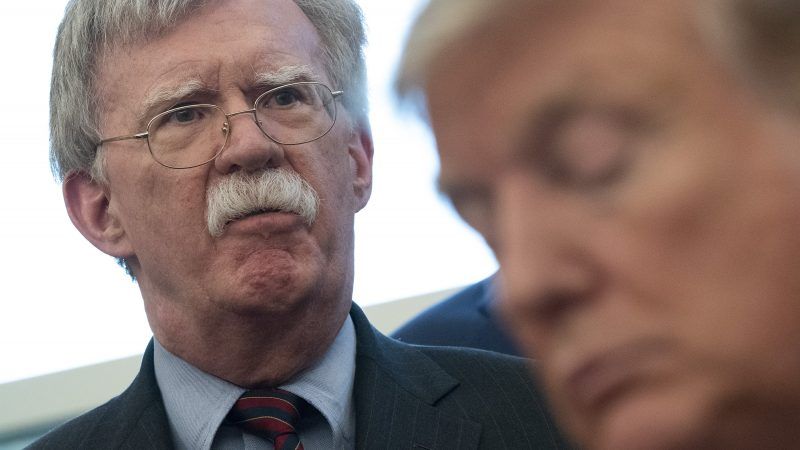Here Are 5 Times Donald Trump Warned Against Going to War With Iran
The president should scroll through his old tweets, rather than listening to John Bolton.

Trump's 2016 campaign was defined largely by the scattershot and freelancing style of his rallies and debate performances, but one of his most consistent and specific positions was one of general skepticism about American military interventions in other countries. He wrecked the Republican primary field, and humiliated Jeb Bush specifically, by simply calling America's post-9/11 wars what they obviously are: a disaster. He took that same approach in dispatching Hillary Clinton, who was saddled with her own long history of supporting wars in Iraq, Libya, and elsewhere.
But Trump wasn't just Monday morning quarterbacking conflicts that were already going poorly. Even before running for president, he warned about the prospect of war with Iran—and about how his predecessor could stoke such a conflict for domestic political reasons.
On at least five occasions between October 2012 and November 2013—a period when tension with Iran was rising, as the Obama administration put pressure on the Iranian government to negotiate a nuclear deal—Trump issued warnings and predictions about the foolishness of war.
Now that Obama's poll numbers are in tailspin – watch for him to launch a strike in Libya or Iran. He is desperate.
— Donald J. Trump (@realDonaldTrump) October 9, 2012
Don't let Obama play the Iran card in order to start a war in order to get elected--be careful Republicans!
— Donald J. Trump (@realDonaldTrump) October 22, 2012
I predict that President Obama will at some point attack Iran in order to save face!
— Donald J. Trump (@realDonaldTrump) September 16, 2013
Remember what I previously said--Obama will someday attack Iran in order to show how tough he is.
— Donald J. Trump (@realDonaldTrump) September 25, 2013
Remember that I predicted a long time ago that President Obama will attack Iran because of his inability to negotiate properly-not skilled!
— Donald J. Trump (@realDonaldTrump) November 11, 2013
Thankfully, Trump's prediction that Obama would launch a war with Iran did not come to pass. But now that he occupies the White House, Trump might want to take a look back through his own Twitter history regarding Iran—particularly those last two tweets, regarding the president's "toughness" and "inability to negotiate."
Lately, Trump has been taking a very different approach. For example, on Sunday (potentially in response to a segment about Iran that ran on Fox News), Trump openly threatened Iran.
If Iran wants to fight, that will be the official end of Iran. Never threaten the United States again!
— Donald J. Trump (@realDonaldTrump) May 19, 2019
That message follows a week in which tensions between the U.S. and Iran reached new highs: A new aircraft carrier was deployed into the Persian Gulf. Nonessential personnel were evacuated from the U.S. embassy Baghdad in anticipation of possible military action. And Sen. Tom Cotton (R–Ark.), a key Trump ally in Congress, was on cable news promising war with Iran would be easy to win.
Despite the stepped-up rhetoric and other signals from the White House, it's not clear that Trump is determined to take America into war. He's reportedly been "frustrated" with advisors like John Bolton—who has been openly talking about his desire to bomb Iran for more than a decade—and Secretary of State Mike Pompeo.
Bolton, of course, was one of the key architects of the war in Iraq, and he now seems determined to lead Trump down the same disastrous path. In the past, Trump has been susceptible to the influence of his top foreign policy advisors. In 2017, when he announced plans to increase the number of American troops in Afghanistan—after previously promising to end that war—Trump credited then-Defense Secretary James Mattis with changing his mind about withdrawing.
The danger now is that Trump could be lured into the same trap he once believed Barack Obama would stumble into—using war as a way to boost domestic political standing.
History suggests that's a mistake. As Jonathan Bernstein points out at Bloomberg, voters have very short memories even if wars go well—George H.B. Bush lost his bid for re-election just months after the conclusion of the First Gulf War, an intervention that had broad support from the American public. If the war goes poorly, it would likely end any hope of a second term for Trump, as Harry Truman's and Lyndon Johnson's political careers remind us.
That's doubly true in Trump's case because much of his appeal in 2016 was the result of voters' desire to scale back America's military involvement in the Middle East and Central Asia. Abandoning that principle should cost Trump dearly, says Ted Galen Carpenter, a senior fellow in foreign policy studies at the Cato Institute.
"Trump's supporters should exhibit no patience for such excuses. The president has nearly unfettered ability to choose his advisers. It was Trump's decision to surround himself with a mixture of stale, conventional thinkers and extreme hawks," writes Carpenter. "If he continues to betray his war-weary supporters, they may well abandon him in the 2020 presidential election, and they would be fully justified in doing so."
The American people elected a man who warned against using war for political leverage—but they might have gotten a president who is doing exactly that.


Show Comments (77)